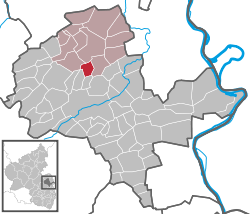Ensheim
| Ensheim | ||
|---|---|---|
|
||
| Coordinates: 49°48′23″N 08°06′56″E / 49.80639°N 8.11556°ECoordinates: 49°48′23″N 08°06′56″E / 49.80639°N 8.11556°E | ||
| Country | Germany | |
| State | Rhineland-Palatinate | |
| District | Alzey-Worms | |
| Municipal assoc. | Wörrstadt | |
| Government | ||
| • Mayor | Klaus Kappler | |
| Area | ||
| • Total | 3.93 km2 (1.52 sq mi) | |
| Elevation | 185 m (607 ft) | |
| Population (2015-12-31) | ||
| • Total | 474 | |
| • Density | 120/km2 (310/sq mi) | |
| Time zone | CET/CEST (UTC+1/+2) | |
| Postal codes | 55232 | |
| Dialling codes | 06732 | |
| Vehicle registration | AZ | |
| Website | www.ensheim-rhh.de | |
Ensheim is an Ortsgemeinde – a municipality belonging to a Verbandsgemeinde, a kind of collective municipality – in the Alzey-Worms district in Rhineland-Palatinate, Germany. It belongs to the Verbandsgemeinde of Wörrstadt, whose seat is in the like-named municipality.
The municipality lies in Rhenish Hesse.
Yearly precipitation in Ensheim amounts to 863 mm (34.0 in), which is in the upper third of the precipitation chart for all Germany, as measured at the German Weather Service’s weather stations. At 74% of the stations, lower figures are recorded. The driest month is February. The most rainfall comes in November. Precipitation varies little from month to month, though, with seasonal swings falling into the lower third. At only 14% of all places are seasonal swings in precipitation less marked.
As early as the mid 4th century, the Franks broke through the fortified Roman border at the Rhine, winning themselves a new homeland in so doing. Rhenish Hesse was occupied by the Franks in the 5th century.
The oldest available written evidence about Ensheim from Frankish times comes from the year 769. On 12 September 769, a man named Almahar, who might have been Ensheim’s landholder, donated a vineyard in the municipal area of Aoenisheim – today’s Ensheim – to Lorsch Abbey. This Almahar also crops up as a witness in a document from Flonheim from 12 June 791 and endowed Lorsch Abbey with further donations.
The first documentary mention in 769 also brings evidence that Roman winegrowing was still being practised.
...
Wikipedia



